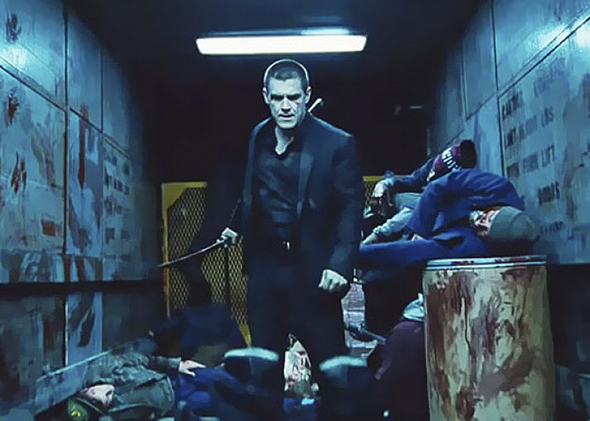Oldboy
Oh boy.

Still courtesy of FilmDistrict
After you've seen Oldboy, come back and listen to Slate's Spoiler Special.
You can also download the podcast here.
One thing you definitely cannot say about Spike Lee’s Oldboy, a remake of the freaky 2003 Korean thriller of the same title directed by Park Chan-wook, is that it’s derivative. Lee’s interpretation diverges from the original in important ways, from the characterization of the titular antihero up through the resolution of the final shocking twist. And though this is as close to a straight-ahead action movie as he’s ever made, you also couldn’t accuse Lee of pandering to the masses—his Oldboy is relentlessly unpleasant and difficult to watch, without offering audiences much moral or aesthetic payoff for its hour and 40 minutes of graphic violence and abject degradation. Oldboy is both original and uncompromising, I’ll give it that—it just doesn’t happen to be any good.
Josh Brolin plays Joe Doucett, an alcoholic advertising executive who, as the movie begins, is a poster boy for how not to live your life. He drinks way too much—so much that he’s been known to end the evening on the sidewalk in a puddle of his own vomit. On the heels of landing an account with an important client, he crassly propositions the client’s girlfriend, blowing the whole deal and earning his boss’s ire. He skips his daughter’s third birthday party and, when his wife objects, explodes at her in a profane torrent of rage. Joe is, not to put too fine a point on it, a consummate asshole, which means that, when he passes out after a bender and is kidnapped by some mysterious entity or entities and locked in an ugly, windowless room for what turns out to be 20 years, it’s hard to know just where our sympathies lie. But Brolin is an able enough actor to infuse these claustrophobic one-man scenes with a sense of Joe’s moral and physical development over the course of two decades. After years spent flailing in self-destructive rage, he stops drinking the vodka shoved with his food through a slot in the door and embarks on a fierce training regimen inspired by the kung-fu movies he watches on the TV his captors have thoughtfully provided.
During his years of captivity, Joe makes a list of all the people who might have hated him enough to do this to him; it fills a full page in one of the notebooks his captors have also left for him. From the TV news, he learns that his wife has been brutally raped and murdered and his daughter adopted by a kind couple. The prime suspect in the murder, because of DNA evidence found at the crime scene: himself. Joe vows to find a way out, locate his daughter, and get revenge on whoever framed and kidnapped him. But before he can effect his own escape, Joe’s captors decide to release him, drugging him to sleep and then depositing him in a trunk in the middle of a field with a cellphone, some money, and a pillowcase full of the anguished letters he’s written to his daughter over the years.
Once he’s out, Joe first tests out his martial-arts skills on a group of college-age football players, in the most gratuitous and unmotivated of the movie’s many scenes of grand-scale violence. Then, he staggers to the bar run by his best friend, Chucky (Sopranos alum and Spike Lee standby Michael Imperioli), and tells his incredible story. Since Joe, as a fugitive from justice, refuses to go to the hospital, Chucky calls in a do-gooding free-clinic employee named Marie (Elizabeth Olsen) to help minister to his friend’s many physical ailments—among other things, Joe has eaten nothing for 20 years but the greasy Chinese takeout delivered daily through his prison door.
Gradually Marie and Joe begin to fall in love, and she joins him on the quest to figure out who kidnapped him and why. That last question becomes particularly pressing when an enigmatic, mincingly effete stranger (Sharlto Copley, playing a villain so broad he’d be asked to tone it down in a James Bond movie) begins calling Joe on his kidnapper-provided phone to drop hints about the search. All you need to know about the web of intrigue into which Joe and Marie are then led is that it’s labyrinthine, decadent, and thoroughly gnarly. At one point, Samuel L. Jackson is tortured with a razor blade while sporting a bleach-blond Mohawk. Later, an entire warehouse full of bad guys—if that term has any meaning in a film in which everyone in sight is pretty rotten—gets dispatched by a hammer-wielding Joe in a long, fluid take that quotes both the original and, of all people, Quentin Tarantino, a frequent target of Lee’s mockery.
Lee directs action with a weird chop-socky sloppiness, as if he’s trying to get the unpleasantness over with as quickly as possible—a strange attitude for a director making a film that contains little but unpleasantness. People who saw and loved the original Oldboy—which, sick as it was, had a propelling, antic energy and a genuine love story at its core—will likely be annoyed by this garish but schematic remake, with its draggy pace and chemistry-free central couple. Viewers who are coming to it cold will, most likely, leave feeling enervated, confused, and queasy. If the talk at the end of Thanksgiving dinner turns to taking the family out to see the new Spike Lee joint, change the subject. You’ll digest your food better.